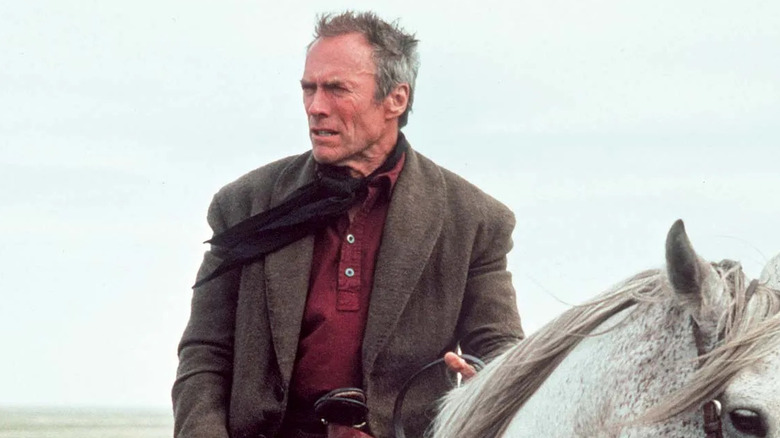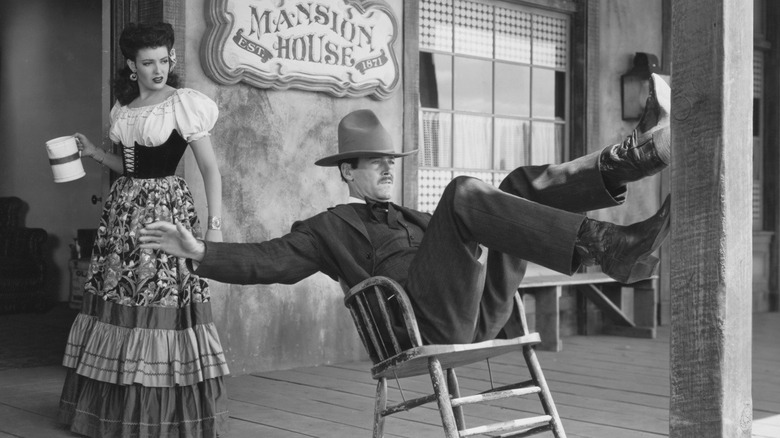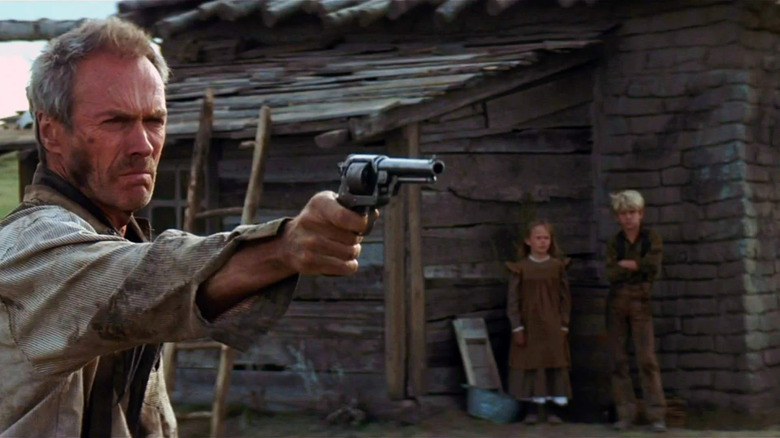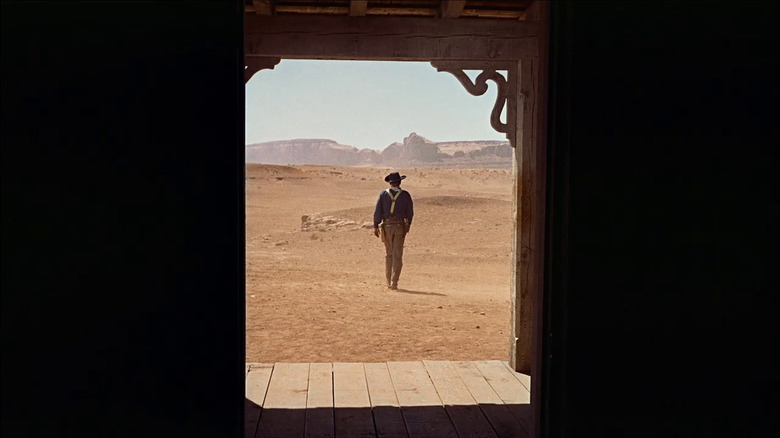Unforgiven Solidified Clint Eastwood's Separation From Directors Like John Ford
If you ask who the most important Western directors in history are, there are three obvious names: John Ford, Sergio Leone, and Clint Eastwood. The Western was the dominant genre in Hollywood from the 1930s to the 1960s, and Ford was the preeminent director of the genre at that time. Leone spearheaded the Spaghetti Western movement; color films set in the west, but produced in Europe, and which were more violent/less glamorous than their Hollywood counterparts. According to Leone:
"Ford, because of his European origins — as a good Irishman — has always seen the problem from a Christian point of view... his characters and protagonists always [looked] forward to a rosy, fruitful future. Whereas I see the history of the West as really the reign of violence by violence."
Eastwood began as Leone's star and then followed in his old boss' footsteps by becoming a director himself. And where Eastwood truly made his mark as a Western director was "Unforgiven." The 1992 film is one of the darkest westerns ever made, and was successful because it leaned heavily on Eastwood's legacy — In the film, an aging outlaw comes out of retirement to confront a new threat and his past sins. However, Eastwood disagrees with idea that he was the "heir" of previous Western directors and stars.
To see if his claims stack up, let's compare how Eastwood approaches the genre differently than Johns Ford and Wayne did.
Civilization comes in Ford's Westerns
Born John Feeney, John Ford was a first-generation Irish-American and explored both halves of his heritage throughout his films. Many of his Westerns are about the encroachment of civilization on the continent's western territories during the mid-19th century. This was all part of Manifest Destiny, the idea that the United States must stretch sea to shining sea.
Ford's 1946 "My Darling Clementine" is one of the best (but loosest) retellings of the gunfight at the O.K. Corral. Henry Fonda as the upright lawman Wyatt Earp brings justice with him, and Tombstone, Arizona becomes a proxy for America itself. Critic Matt Zoller Seitz has argued "Clementine" was an inspiration for the TV Western "Deadwood," another story of a lawman in a lawless town. Seitz literally wrote the book on "Deadwood," so I think we can take his word.
Ford's most famous in-color Western is "The Searchers." John Wayne plays Ethan Edwards, who joins his adopted nephew Martin Pawley (Jeffrey Hunter) on a quest to find their niece/sister Debbie (Natalie Wood), who was kidnapped by a Comanche tribe. Ethan is more flawed than most of Wayne's characters and his racism is not endorsed. However, the film's sympathies still ultimately lie with the white settlers while the Indigenous characters are a shadowy threat standing in the way of Manifest Destiny.
Ford's 1962 film "The Man Who Shot Liberty Valance" feels like his closing statement on westerns. James Stewart plays Ransom Stoddard, a young lawyer from the east, while John Wayne plays his usual type as hard-nosed rancher Tom Doniphon. As we know from the film's decades-later framing device, Stoddard becomes a senator while Doniphon dies in anonymity. The west was won because the wild west faded away.
How Unforgiven compares
It's clear Ford views the "taming" of the west as a good thing. Yet, his films are still twinged with nostalgia for the time before that taming, a romantic view of frontier life and the tough guys who lived it. Stoddard's mourning for Doniphon is proof of that. "Unforgiven" lacks the romanticism about those types of men and is just as cynical about civilization.
Reviewing "Unforgiven" for Cinephilia & Beyond, Sven Mikulec argued:
"Ford believed deeply in the civilizing impact of society, the transformation of the jungle into the garden. In Ford's dusty towns, there is always a church or a school going up, the frame building standing starkly against the raw landscape. Eastwood's westerns are about darkness and pain, and even when the evil has been avenged, the wounds rarely heal."
In "Unforgiven," the closest thing to civilization seen is the town of Big Whiskey, Wyoming, ruled like a fiefdom by the ironfisted Sheriff "Little Bill" Daggett (Gene Hackman). In "Clementine" the lawmen are the heroes, in "Unforgiven" frontier justice is nothing of the sort.
Most stories of legendary gunfighters in "Unforgiven" are aggrandized and the few true tales are too vile to be celebrated. English Bob (Richard Harris), the hero of many a dime novel, is a total fraud. The Schofield Kid (Jaimz Woolvett) talks a big game but has to drown his guilt once he actually kills a man. Eastwood's "hero" Bill Munny was in his youth little more than a violent, drunken thief. All he has to his name now is a dead wife, a poorly-faring farm, and a heavy conscience. Frequently throughout the film, Munny utters a resigned "yeah," even when Daggett proclaims they'll see each other again in Hell.
Different endings
Two moments from Ford and Eastwood deserve special comparison: the endings of "The Searchers" and "Unforgiven." In the former, Ethan succeeds in rescuing Debbie. But he can't join her and Martin back in civilized life, so he leaves. In "Unforgiven," Munny avenges the death of his friend Ned Logan (Morgan Freeman) by killing Daggett and his deputies and then rides off back home. On the surface, these are similar endings, but the context reveals the difference between the stories and their directors.
In the broad view, "The Searchers" is a happy ending — the bitterness is simply that Ethan can't partake in it or bring himself back to civilization. In "Unforgiven," violence solves nothing but Munny's own satisfaction and he rides away like the Angel of Death, atop a pale horse. "Unforgiven" is an inverse of "The Searchers" — in Ford's movie, a violent man reclaims his humanity at a key moment. In Eastwood's, a man trying for peaceful redemption succumbs to his old ways. In both the opening and closing narration of "Unforgiven," Munny is called, "a man of notoriously vicious and intemperate disposition," reflecting this inability to change.
Speaking to the LA Times in 1992, Eastwood was asked if he was the heir to John Wayne. He answered:
"I've had some luck with [westerns], but I don't think in terms of that. I just think in terms of the story. It couldn't just be, 'Oh, Clint Eastwood, you've done a few (Westerns), you do it."
For sure, "Unforgiven" encapsulates Eastwood's pet themes — masculinity, libertarianism, and the wounds of violence — which he's explored in other genres. But with how different his view of the western is from Ford or Wayne's, it makes sense why he doesn't see them as working in the same tradition.



